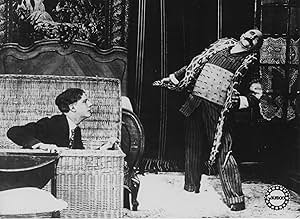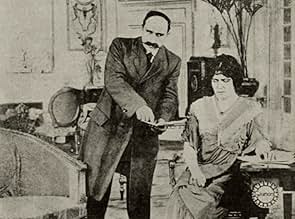VALUTAZIONE IMDb
6,9/10
2658
LA TUA VALUTAZIONE
Aggiungi una trama nella tua linguaInspector Juve is tasked to capture the infamous criminal genius Fantômas who, ruthless and particularly elusive, changes his appearance and holds Paris' high society in a crippling grasp.Inspector Juve is tasked to capture the infamous criminal genius Fantômas who, ruthless and particularly elusive, changes his appearance and holds Paris' high society in a crippling grasp.Inspector Juve is tasked to capture the infamous criminal genius Fantômas who, ruthless and particularly elusive, changes his appearance and holds Paris' high society in a crippling grasp.
- Regia
- Sceneggiatura
- Star
- Premi
- 1 candidatura in totale
Edmund Breon
- Inspector Juve
- (as Edmond Bréon)
André Volbert
- L'acteur Valgrand
- (as Volbert)
Recensioni in evidenza
A multiple-reel drama in which there are good situations and well handled. M. Navarre plays a dual role and does splendid work. Opposite him is the Gaumont's famous leading woman, Mme. Renee Carl; she justifies every expectation. The story is of a bold thief, of the gentleman sort, who commits a robbery. He has also committed a murder. After his arrest and conviction, the wife of the murdered man, in love with the thief, bribes the keepers of the latter to bring him to her home, a short distance from the prison. It is the night preceding his execution. The same evening, a famous actor gives a representation of the condemned man in his cell. The impersonator is decoyed to the house of the woman after the murderer has arrived. He is still in his convincing make-up. After the woman has drugged him, the jailers take him back to his cell. As he is being prepared for the execution, a detective discovers that the man still under the influence of the drug is not the murderer. The final curtain is to the effect that "Henceforth it is Juve (the detective) versus Fantomas." So we may expect a continuance of the story at a later time. The picture will interest. - The Moving Picture World, June 28, 1913
The story of Fantomas's exploits and adventures are also those of the woman he loves and the men trying to catch him. In a time when films still used novelty to draw crowds these shorts entertained audiences with exhilarating escapes, astounding disguises, and taboo violence. Fantomas is a series of five short films produced in the golden age of silent film in France, 1913 to 1914. Each episode continues the story of the criminal Fantomas has he evades Inspector Juve time and time again. These films were directed by Louis Feuillade and produced by the Gaumont studios. Critics and fans worldwide have enjoyed these films and the mystery/detective novels they were based on.
Fantômas (Rene Navarre) makes it as the emperor of Crime. First is the robbery at the Royal Palace Hotel. Then he abducts Lord Beltham...
Critic Maurice Raynal wrote that "There is nothing in this involved, compact, and concentrated film but explosive genius." I absolutely agree with this assessment.
Film historians (and amateurs like myself) tend to focus on American innovation (Thomas Edison) and the rise of the German film. While these are important areas (I believe the Germans did more for cinematography than any other group), "Fantomas" shows that the French were in the game, too.
This is an incredible film, and it has been touched up very nicely by the folks at Kino. It could easily pass for being the 1920s...
Critic Maurice Raynal wrote that "There is nothing in this involved, compact, and concentrated film but explosive genius." I absolutely agree with this assessment.
Film historians (and amateurs like myself) tend to focus on American innovation (Thomas Edison) and the rise of the German film. While these are important areas (I believe the Germans did more for cinematography than any other group), "Fantomas" shows that the French were in the game, too.
This is an incredible film, and it has been touched up very nicely by the folks at Kino. It could easily pass for being the 1920s...
For a person who would have read the Souvestre /Allain's novels,Feuillade's movies would fatally be a disappointment.I read them when I was sixteen and I was fascinated by this mysterious masked figure .Today "Fantomas" has lost much of its popularity ,probably because he was not a "nice "character ,like Arsene Lupin who is still enjoying success.But anyway Maurice Leblanc was a better writer than Pierre Souvestre and Marcel Allain.
Feuillade's adaptation is not very satisfying:he ruled out the best part of the first volume ,which took place in a château where the marquise de Langrune was murdered (the first word of the saga is "Fantomas!" when nobody had still heard of him).That's after this crime that Charles Rambert became Jerome Fandor -in Feuillade's movie ,he is introduced as Juve's best friend whereas Juve really "made " Fandor.
Even more embarrassing is the ending Feuillade chose -he had to make Gaumont's money work for them ;these are his own words- for what was primarily a horror story: in the novel,Valgrand is really guillotined .It's only a movie after all ,so what's the point of saving him apart from making a film "suitable for any audience"? The Danidoff episode seems out of its context.But the biggest mistake is to have shown Fantomas.Fantomas had no face or he had other people's faces (such as the actor's).By showing since the cast and credits the actor who plays the "hero",they make the character lose 90% of its appeal.
Feuillade had talent for story telling ,nobody can deny.The scene of the substitution retains a sense of mystery .Feuillade's greatest merit -and it's quite important-was to attract the crowds : the serial genre forced them to come back and come back again if they wanted to know if the criminal would be finally caught.He was the granddaddy of so many series and miniseries in the world that he would never be thanked enough just for that.
For people who would like to know about the first part of the novel,I would recommend Paul Féjos's "Fantomas" (1932),which includes spooky scenes in the old château and features Fandor when he was still Charles Rambert.
The De Funes movies ,unless you are a fan of the actor ,should be avoided ,for they kept nothing from the novels but some of the proper nouns.
On the other hand, Chabrol's miniseries in the late seventies /early eighties is to be commended:Helmut Berger was an ideal Fantomas and he got good support from Jacques Dufilho as Juve and from Pierre Mallet as Fandor.
Feuillade's adaptation is not very satisfying:he ruled out the best part of the first volume ,which took place in a château where the marquise de Langrune was murdered (the first word of the saga is "Fantomas!" when nobody had still heard of him).That's after this crime that Charles Rambert became Jerome Fandor -in Feuillade's movie ,he is introduced as Juve's best friend whereas Juve really "made " Fandor.
Even more embarrassing is the ending Feuillade chose -he had to make Gaumont's money work for them ;these are his own words- for what was primarily a horror story: in the novel,Valgrand is really guillotined .It's only a movie after all ,so what's the point of saving him apart from making a film "suitable for any audience"? The Danidoff episode seems out of its context.But the biggest mistake is to have shown Fantomas.Fantomas had no face or he had other people's faces (such as the actor's).By showing since the cast and credits the actor who plays the "hero",they make the character lose 90% of its appeal.
Feuillade had talent for story telling ,nobody can deny.The scene of the substitution retains a sense of mystery .Feuillade's greatest merit -and it's quite important-was to attract the crowds : the serial genre forced them to come back and come back again if they wanted to know if the criminal would be finally caught.He was the granddaddy of so many series and miniseries in the world that he would never be thanked enough just for that.
For people who would like to know about the first part of the novel,I would recommend Paul Féjos's "Fantomas" (1932),which includes spooky scenes in the old château and features Fandor when he was still Charles Rambert.
The De Funes movies ,unless you are a fan of the actor ,should be avoided ,for they kept nothing from the novels but some of the proper nouns.
On the other hand, Chabrol's miniseries in the late seventies /early eighties is to be commended:Helmut Berger was an ideal Fantomas and he got good support from Jacques Dufilho as Juve and from Pierre Mallet as Fandor.
NOTE: This isn't a review of the entire "Fantomas" film serial (which, in its entirety, is 5 1/2 hours in length), but of the 54 minute film that starts off the series.
In 1913, a bit over a hundred years prior to this review, cinema was a lot different. There weren't nearly as many ways to explore feelings of humor, anger, and sadness on the screen as there are in today's cinematic world. However, around this time, a few filmmakers began to change the way film was, filmmakers like Georges Melies, D.W. Griffith, and Louis Feuillade, the director of this film.
While I'm sure that the film serial gets far more interesting and entertaining as it goes on, this installment was surely great! Already, there's murder, suspense, and crime as well as some pretty interesting filmmaking techniques (ex: use of close ups, a newly invented technique at that time).
Overall, it definitely makes me excited for the rest of the film serial!
In 1913, a bit over a hundred years prior to this review, cinema was a lot different. There weren't nearly as many ways to explore feelings of humor, anger, and sadness on the screen as there are in today's cinematic world. However, around this time, a few filmmakers began to change the way film was, filmmakers like Georges Melies, D.W. Griffith, and Louis Feuillade, the director of this film.
While I'm sure that the film serial gets far more interesting and entertaining as it goes on, this installment was surely great! Already, there's murder, suspense, and crime as well as some pretty interesting filmmaking techniques (ex: use of close ups, a newly invented technique at that time).
Overall, it definitely makes me excited for the rest of the film serial!
Lo sapevi?
- ConnessioniFeatured in Fantômas 70 (2001)
I più visti
Accedi per valutare e creare un elenco di titoli salvati per ottenere consigli personalizzati
- How long is Fantômas: In the Shadow of the Guillotine?Powered by Alexa
Dettagli
- Data di uscita
- Paese di origine
- Sito ufficiale
- Lingue
- Celebre anche come
- Fantômas: In the Shadow of the Guillotine
- Luoghi delle riprese
- 3 Rue Huraut, Villemomble, Seine-Saint-Denis, Francia(Beltham's house)
- Aziende produttrici
- Vedi altri crediti dell’azienda su IMDbPro
- Tempo di esecuzione
- 54min
- Colore
- Mix di suoni
- Proporzioni
- 1.33 : 1
Contribuisci a questa pagina
Suggerisci una modifica o aggiungi i contenuti mancanti



























